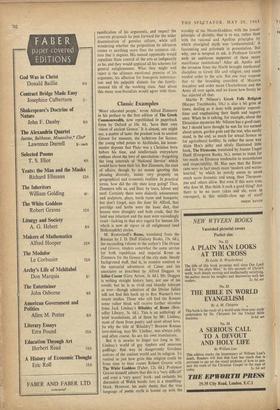Classic Examples
`MOST educated people,' wrote Alfred Zimmern in his preface to the first edition of The Greek Commonwealth, now republished in paperback form by Oxford at 10s. 6d., `have their own vision of ancient Greece.' It is almost, one might say, a matter of taste: the prudent look to ancient Greece for measure, the lecherous for licence; the young rebel points to Alcibiades, his house- master deposes that Plato was a Christian born before his time, and intellectuals everywhere enthuse about the love of speculation—forgetting the long intervals of `National Service' which would have been their lot. But Zimmern, the man of affairs, though by no means ignoring this pleasing diversity, insists very properly on geographical and economic realities. In practical terms, how did the city state keep going? Thus, Zimmern tells us. and thus; by tears, labour and steel. Certainly there were dialectic amusements and sculpture, plays, torch races and banquets; but don't forget, says the dour Sir Alfred, that porridge and herbs were the basic diet, that houses were draughty and beds crude, that the land was reluctant and the men were exceedingly cruel—lacking in that nice regard for human life which is now de rigour in all enlightened (and Hellenophile) circles.
M. Rostovtzeff's Rome, translated from the Russian by J. D. Duff (Galaxy Books, 13s. 6d.), the succeeding volume to the author's The Orient and Greece, renders somewhat the same service for both republican and imperial Rome as Zimmern for the Greece of the city state. Steady background stuff, that is, in massive contrast to the mercurial adventures of Caesar and his associates as described by Alfred Duggan in Julius Caesar (Grey Arrow, 3s. Gd.). Mr. Duggan is writing straight history here, not one of his novels, but he is as vivid and blandly tolerant as ever—though admirers of the Divine Julius will not find this book up to Rex Warner's two recent studies. Those who still find the Roman scene rather bleak will receive further stimulus from Jack Lindsay's Ribaldry of Rome (Best-
seller Library, 3s. 6d.). This is an anthology of brief translations, all of them by Mr. Lindsay, most of them from poetry and most about love. So why the title of `Ribaldry'? Because Roman love-making, says Mr. Lindsay, was always jolly and often coarse. So are his own translations.
But it is unwise to linger too long in Mr.
Lindsay's world of gay tipplers and amorous codlings: that way lie dangerously frivolous notions of the ancient world and its religion. To remind us just how grim this religion could be from time to time comes Robert Graves with The White Goddess (Faber, I 2s. 6d.). Professor Graves himself admits that this is a `very difficult' and even a 'very queer' book; and certainly his discussion of Welsh bardic lore is a stumbling- block. However, his main thesis, that the true language of poetic myth is bound up with the
worship of the Moon-Goddess, with the female principle of divinity, that is to say, rather than with the rational and Apolline principles by which aboriginal myth was 'contaminated,' is fascinating and polymath in presentation. But why, one is tempted to ask, is Professor Graves such an assiduous supporter of these messy matrilinear institutions? After all. Apollo and the invasion from the North brought intellectual discipline to Greek life and religion, and much needed order to the arts. But one may suppose that to the brooding anarchist of Majorca discipline and order mean Charterhouse and the Army all over again, and we know how firmly he has rejected all that.
Martin P. Nilsson's Greek Folk Religion (Harper Torchbooks, 10s.) is also a bit grim at times, dealing as it does with popular supersti- tions and emphasising their depth and import- ance. When he is talking, for example, about the Eleusinian mysteries Mr. Nilsson has a good case; but I should have thought he was far too earnest about satyrs, garden gods and the rest, who surely stand, in the end, as much for sexual licence as for agricultural fertility. In rather the same way Alain Hus's pithy and nicely illustrated little book, The Etruscans, translated by Jeanne Unger Duell (Evergreen Books, Gs.), seems to insist far too much on Etruscan tendencies to monotheism and respectability. M. Hus says that the Etrus- cans were in fact much more 'modern and warm- hearted,' by which he merely seems to mean much more domestic and smug, than Theopom- pus and others allow. But even if this were true, why does M. Hus think it such a good thing? Are there to be no more cakes and ale, even in retrospect, in this middle-class age of ours?
SIMON RAVEN














































 Previous page
Previous page